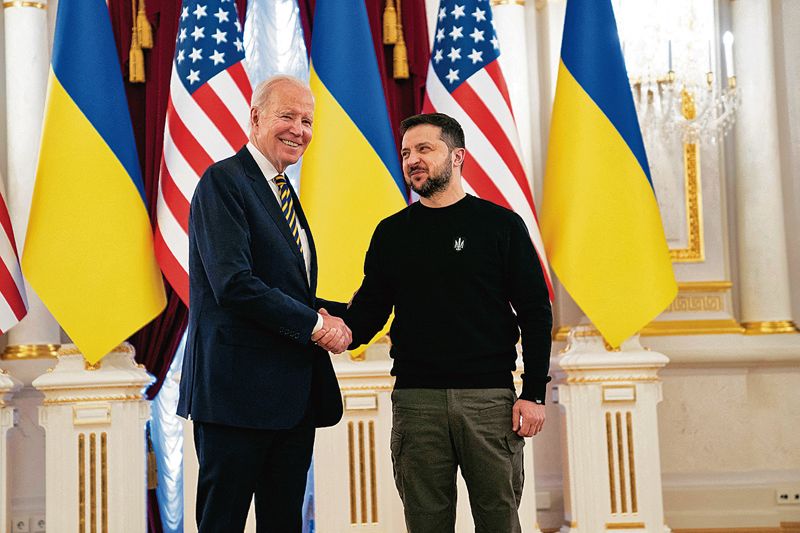
BOUNTY: The Ukraine war offers the US an opportunity to expand demand for its defence industry. Reuters
TK Arun
Senior Journalist
IT is high time the West abandoned its hypocrisy over the Ukraine war, and called upon Ukraine and Russia to negotiate peace, instead of egging on the Ukrainians to risk ever more lives in a lengthening war that drains Russian materiel and enhances the military edge the United States already has over Russia, without any loss of American lives. Several stories on the growth of ghost fleets of oil tankers — including by one India-based shipping company, Gatik — that help Russia evade the West’s sanctions against its oil exports are part of the propaganda that justifies the prolongation of the war. The portrayal of Russia as a nefarious villain, carrying out varied skulduggery, is central to such propaganda.
The Wall Street Journal (January 29), Bloomberg (March 19) and the Financial Times (May 4) reported on the sudden growth of a shipping company, Gatik, that lists a locked room in a rundown Mumbai shopping mall as its registered office and ships Russian crude from Russian ports to Indian terminals and Greek locations known to be favoured for ship-to-ship transfers. What changes in these reports is the number of tankers owned by the shipping company. The WSJ story pegged the number at 25, and, three months later, the FT estimates Gatik’s fleet strength to be 58. These stories marvel at the overnight growth of tanker giants in India and the UAE and suggest their covert collusion in Russia’s attempts to evade the West’s oil sanctions following its invasion of Ukraine in February 2022.
These companies have to buy insurance; and selling shipping insurance, particularly for oil, is a rich-world business. Insurance companies have to satisfy themselves that the fleets they insure buy Russian oil at a price below the cap set by the G7 of $60 a barrel. Gatik, Fractal and Buena Vista are some of the mysterious tanker fleets that have come up to cater to the business of transporting Russian crude that western companies have shunned, more to register their moral rectitude than to comply with the letter of the sanctions announced by their governments. The insurance companies are obliged to note down the registered owners of the fleets they insure, but they do not, for reasons of financial discretion that predate by far the Ukraine war, insist that the registered owners are the beneficial owners as well. So, no one knows who these new giants of the oil tanker business really belong to, but the news reports speculate that the Russian oil giant Rosneft itself might be the owner.
Now, why should the export of oil from Russia by new fleets that have come up to take on the job shirked by self-righteous western cargo companies be presented as a dark and devious move? The West, while it has sanctioned Russian crude, wants Russian oil to keep flowing so that global supply remains where it was before the war and supply shortfalls do not increase energy prices too much. While ranting and raving against Russia’s oil exports financing its invasion of Ukraine, the US and Europe have been happily importing the petrol and diesel Indian refiners have been churning out from crude imported from Russia and shipped to these markets.
There is no reason for India and other countries of the global South to collude in the charade of the West both shunning Russian oil and guzzling the fuels refined from it, while hiding this contradiction in a fog of moral outrage at Russia’s behaviour.
Wars normally cost nations blood and treasure. The Ukraine war runs no risk of American GIs coming back home in body bags, as its direct casualties consist only of Ukrainians and Russians. And the cost of arming the Ukrainians is shared among all members of the North Atlantic Treaty Organisation. In other words, what is happening in Ukraine is a low-cost war for the US, even as it directly and indirectly expands the demand for America’s defence industry — all European nations, as well as the alarmed Japan and South Korea, are scrambling to step up their defence budgets and buy American weapons.
The US and its European allies are willing to inflict high energy and food prices on the world, to keep the war going. Denizens of the rich world might grumble about high prices but will get through them, often wresting higher wage settlements from their employers and energy subsidies from their governments. The people of the developing world are the worst victims of the war. Countries in Africa that have come to depend on food imports by the UN’s World Food Programme have suffered hunger, when food exports from the Black Sea ports were disrupted by the war. Brazilian farmers found it hard to grow their crops as the West imposed an embargo on fertiliser exports from Russia.
The rise in energy and food prices in the wake of the war has led to coordinated interest rate increases by rich world central banks, led by the US Fed. This has strengthened the dollar vis-à-vis other currencies, leaving a host of countries to import inflation while importing goods with prices denominated in dollars, including essentials like oil and gas.
This has led to a tighter monetary policy in the developing world, killing growth and adding to the people’s misery. Popular unrest has led to regime changes in several countries, including Sri Lanka.
The West presents the Ukraine war to the world as a war of choice on Russia’s part, and a blatant violation of Ukraine’s sovereignty and territorial integrity. The truth is, without its naval base in Sevastopol, Crimea, Russia would be defanged as a global power. Russia’s smooth access to Crimea, which it annexed in 2014, calls for Ukraine to be neutral, if not friendly, to Russia. Crimea had never been a part of Ukraine before Soviet leader Khrushchev gifted it to Ukraine in 1954, and has always been a part of Russia, right from the baptism of Russian ruler Vladimir in the 10th century.
If Ukraine seeks to overlook this reality, and wants to hold on to every inch of land that had been a part of Ukraine on one arbitrary count or the other, it might have a problem on its hand if Poland were to adopt a similar logic, vis-a-vis traditionally Polish territories such as Lviv, now in Ukraine.
A multipolar world is a better place than either a unipolar one or a bipolar hegemony of the US and China. This is the wood we keep missing, thanks to trees such as ghost fleets of oil tankers.
Join Whatsapp Channel of The Tribune for latest updates.




























